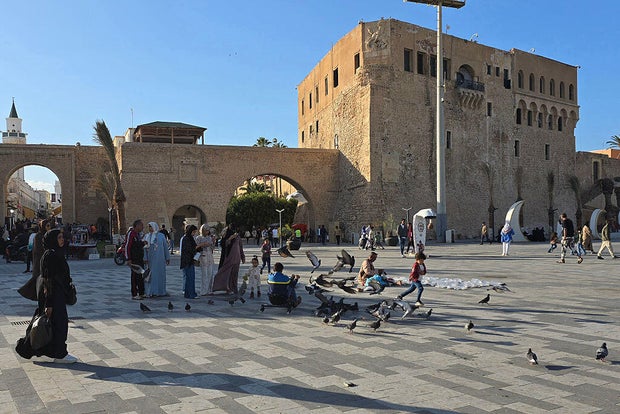The Trump administration is reportedly considering a plan to deport migrants to Libya as part of its expanded deportation campaign, according to details shared by two U.S. officials. This move comes amidst ongoing debates over immigration policies and border control measures pursued by the U.S. government. The officials, who chose to remain anonymous, disclosed that operations could potentially be managed by the U.S. military and may commence as soon as this week.
Libya is currently grappling with severe political and social instability. It has been in a state of turmoil since the civil war began in 2011, following the fall of Muammar Gaddafi. The country is presently divided between two main factions: the U.N.-backed Government of National Accord based in Tripoli in the west, and the Libyan National Army, led by Commander Khalifa Haftar, which controls the eastern part of the country. This division has led to continuous conflicts and disruption, making Libya a contentious choice for deportations.
The idea of deportations to such a nation raises significant concerns due to Libya’s troubled human rights record and unsafe conditions. The nation has been notorious for its treatment of migrants, particularly those from sub-Saharan Africa attempting to cross the Mediterranean to Europe. Reports from humanitarian groups like Doctors Without Borders and statements from U.S. officials highlight the brutal conditions faced by migrants detained in Libya, including abuse, lack of due process, and torture in detention centers.
Moreover, the U.S. State Department has issued a Level 4 travel advisory for Libya, advising citizens against traveling to the country due to risks of crime, terrorism, unexploded landmines, civil unrest, kidnapping, and armed conflict. This advisory underscores the dangers present in the region, further questioning the suitability and safety of deporting migrants to such a location.
Media outlets reported the proposed deportation plans earlier this week, which led to public outcry and legal challenges. Both governing factions in Libya have denied entering any deportation agreement with the U.S., adding to the confusion and controversy surrounding the issue.
In response to these reports, a group of advocates in Massachusetts filed an emergency motion in a federal district court to prevent the administration from moving forward with these deportations. They argue that deporting migrants to Libya, a country they have no ties to and where they might face severe dangers, without proper legal proceedings or notification to their attorneys, would be unjust and unlawful. Federal Judge Brian Murphy echoed this sentiment, highlighting that such actions would contravene earlier court rulings that protect migrants from being deported to third countries without due legal processes and necessary legal counsel.
The Trump administration’s migration policy has been characterized by stringent measures to deter illegal migration and control border entry. The administration has been active in forging diplomatic agreements with several countries to accept deported migrants. This includes reaching out to nations across continents including Africa, Latin America, and even Europe, in efforts to establish third-country deportation agreements. For instance, deals have been negotiated with countries like Costa Rica and Panama to accept deportees from Asia and Africa, and similar attempts have been made with other nations including Angola, Benin, Eswatini, Moldova, and Rwanda.
However, not all negotiations have been successful. For example, after being approached by the U.S., the Angolan embassy in Washington declared that the country would not accept deportees from third countries, highlighting the complexities and challenges in reaching such deportation agreements.
These developments in U.S. immigration policy are unfolding amid broader debates over how to handle migration and the ethical implications of deporting individuals to countries where they may face significant risks. The Trump administration’s efforts have been criticized both domestically and internationally for potentially infringing on the rights of migrants and for the geopolitical ramifications of utilizing less stable countries as destinations for deportation.
As the situation develops, the global community, legal experts, and human rights organizations continue to watch closely, calling for actions that ensure the safety, rights, and dignity of all individuals involved. This ongoing issue not only reflects the challenges within U.S. immigration policy but also underscores the broader conflicts and humanitarian crises that persist around the world, particularly in places like Libya.









